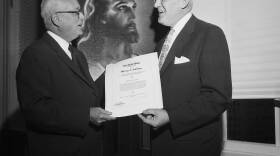EXPLORE MORE
Coming up Thursday on BPR:
NBC’s Chuck Todd
NAACP’s Michael Curry
Environmentalist Bill McKibben
Boston Globe film critic Odie Henderson
Recent segments
-
The Revs Talk Religious Iconography, Antisemitism, And White Jesus
The conversation followed a recent assertion from President Trump, who claimed that Black Lives Matter protesters want to tear down statues of Jesus. -
Bob Thompson Reviews 'Disclosure'
The new documentary, available to stream now on Netflix, grapples with the history of trans representation in media. -
Shirley Leung: Black And Brown Executives Form Their Own Racial Equity Fund
The fund, led by 19 business executives, will prioritize their giving to nonprofits also led by people of color, in an effort to counteract what is known as philanthropic redlining. -
Callie Crossley On Celebrities In Blackface: 'What Is the Attraction For People Who Should Know Better?'
The “Under the Radar” host expressed frustration with white entertainers who claim ignorance after getting called out for deploying racist tropes. -
Jared Bowen Reviews Jon Stewart’s ‘Really Charming’ Film ‘Irresistible’
The WGBH Executive Arts Editor praised the comedy, which reckons with the absurdity of U.S. politics. -
Sue O'Connell: Trump May Be Angling For Something Other Than Re-Election
"Donald Trump's going to have a hard time getting re-elected," she said. "Then what's his next play? What's this con man's next revenue stream?'
Listen to previous shows
-

BPR Full Show: Voting Rights and the Legacy of Rev. Martin Luther King, Jr.
Today on Boston Public Radio: Rev. Cornell William Brooks discusses the Black faith leaders that engaged in a hunger strike for voting rights, and shares why he likens the Jan. 6 Capitol attacks to the Confederate attack at Fort Sumter. Brooks is the Hauser Professor of the Practice of Nonprofit Organizations and Professor of the Practice of Public Leadership and Social Justice at the Harvard Kennedy School. Brooks is the former president and CEO of the National Association for the Advancement of Colored People (NAACP), a civil rights attorney, and an ordained minister. We then ask listeners about failed voting rights legislation, and what it means for midterms and the 2024 presidential election. Simon van Zuylen-Wood talks about Hillbilly Elegy author J.D. Vance’s run for U.S. Senate, and his decision to tag himself as a conservative outsider. van Zuylen-Wood is a freelance journalist based in NYC, who’s recently written about the radicalization of JD Vance. Evan Horowitz updates us on how Mass. could bring in more than $1 billion in revenue if voters approve a ballot question to implement a “Millionaire’s Tax” in the state. Horowitz is executive director of the Center for State Policy Analysis at Tufts. Revs. Irene Monroe and Emmett G. Price III share their thoughts on the fate of the Democrats’ voting rights bill, and reflect on the life and legacy of Rev. Martin Luther King, Jr. Monroe is a syndicated religion columnist and the Boston voice for Detour’s African American Heritage Trail. Price is founding pastor of Community of Love Christian Fellowship in Allston, the Inaugural Dean of Africana Studies at Berklee College of Music. Together, they host the “All Rev’d Up” podcast at GBH. We open the phone lines, continuing our conversation with listeners on the state of voting rights. We end the show by replaying our conversation with New Yorker writer Jelani Cobb on his book, “The Essential Kerner Commission Report,” which places the 1968 Kerner Commission Report in today’s political context. -

BPR Full Show: Snail E-mail
Today on Boston Public Radio: We begin the show by asking listeners their thoughts on incentives and disincentives to raise vaccination rates, like free doughnuts or higher health insurance. Bill McKibben reviews the apocalyptic climate film “Don’t Look Up,” and talked about the state of climate change as parts of the world see record temperatures. McKibben is co-founder of 350.org and the author of numerous books about climate change. His latest book is “Falter: Has the Human Game Begun to Play Itself Out?” Callie Crossley talks about Maya Angelou becoming the first Black woman to appear on a U.S. quarter, laws requiring beauticians to undergo domestic violence prevention training and Oreos turning 110 years old. Crossley hosts GBH’s Under the Radar and Basic Black. Andy Ihnatko explains a chip shortage affecting printer companies and allegations of bullying over green and blue chat bubbles on iPhones. Ihnatko is a tech writer and blogger, posting at Ihnatko.com. Christopher Muther shares tips on weighing the risks of travel with Omicron on the rise, the costs and benefits of travel insurance and why he loves Ronnie Spector. Muther is a Boston Globe travel columnist and travel writer. Sue O’Connell discusses Amy Schneider becoming the first woman to break $1 million on Jeopardy, and Buckingham Palace forcing Prince Andrew to relinquish military and honorific titles amid a sexual-abuse lawsuit and ties with Jeffrey Epstein. O’Connell is the co-publisher of Bay Windows and the South End News, as well as NECN's political commentator and explainer-in-chief. Sue O'Connell on BPR | Jan. 14, 2022 We end the show by asking listeners for their thoughts on an email platform that intentionally slows down email delivery to provide a work-life balance. -

BPR Full Show: Rent on the Rise
Today on Boston Public Radio: Chuck Todd updates listeners on the latest political headlines, including the state of voting rights and filibuster reform. Todd is the moderator of “Meet the Press,” host of “Meet the Press Daily” on MSNBC and the political director for NBC News. Then, we ask listeners whether they support activists going to politician’s doors to protest. Andrea Cabral discusses Governor Charlie Baker commuting the sentences of Thomas E. Koonce and William Allen and legal fights over vaccination mandates. Cabral is the former Suffolk County sheriff and the former Massachusetts secretary of public safety. She is currently the CEO of the cannabis company Ascend. Then, we ask listeners for their housing horror stories with rent on the rise. Dr. Katherine Gergen-Barnett takes questions on all things health from listeners, including the state of Omicron and latest mask guidance. Gergen-Barnett teaches in the family medicine department at Boston Medical Center and Boston University Medical School. -

BPR Full Show: Rep. Ayanna Pressley calls on Biden to cancel student debt
Today on Boston Public Radio: We begin the show by asking listeners if they think the lies of the 2020 election will repeat themselves in the 2022 midterms and 2024 presidential race. Rep. Ayanna Pressley calls for President Joe Biden to cancel student loan debt, criticizes Governor Charlie Baker’s pandemic response and pushes for urgent action on voting rights. Pressley is the U.S. Representative for Massachusetts 7th District. Rep. Mike Connolly weighs in on state debates over rent control, and whether he thinks there is enough momentum to get Mayor Michelle Wu’s housing plan passed. Connolly is a Massachusetts State Representative and co-sponsor of the Tenant Protection Act. Shirley Leung talks about today’s tent demolitions at Mass. and Cass, and luxury apartment buildings providing access to rapid tests. Leung is a business columnist for The Boston Globe and a Boston Public Radio contributor. Corby Kummer updates listeners on changes to SNAP benefits that would allow people to purchase hot meals and from restaurants, and Taco Bell’s new subscription service. Kummer is the executive director of the Food and Society policy program at the Aspen Institute, a senior editor at The Atlantic and a senior lecturer at the Tufts Friedman School of Nutrition Science and Policy. Art Caplan discusses the first heart transplant using a genetically modified pig heart, and debates over the severity of Omicron. Caplan is director of the division of medical ethics at the New York University School of Medicine. We end the show by talking with listeners about whether they have attended large events or made other risky pandemic decisions they regret. -

Food stamp benefits could soon be used to purchase restaurant meals, prepared foods
Numerous states are looking into extending food stamp use to restaurants and prepared meals to keep up with what academics are calling the lack of time, skills, resources, and physical abilities of some SNAP users. Award-winning food writer Corby Kummer joined Boston Public Radio on Wednesday to share why more states are looking into joining the SNAP Restaurant Meals Program, and where food policy needs to change. “When it comes down to it, realistically, the people who need and rely on nutrition assistance often work two jobs, they’re supporting families, and they have no time at all to cook and prepare the wholesome food that SNAP was originally designed to restrict them to buying,” Kummer said. When Restaurant Meals started in 2003, 19 states participated in the program. That number shrank to just four states by 2018. Now, six states — Arizona, California, Maryland, Michigan, Rhode Island, and Virginia — let some people who receive SNAP benefits use food stamps at restaurants. Illinois and New York are both in the process of applying to the Restaurant Meals Program. Kummer told Boston Public Radio that states have to prove that there are enough high need residents — such as “adults over 60, people with disabilities, and those who are homeless and their spouses” — to get exemptions in the Restaurant Meals Program and SNAP. While the Restaurant Meals Program has been applauded by food equity advocates and anti-hunger organizations, small restaurants have been slow to participate in the program due to lengthy bureaucratic processes. Instead, large chains like McDonald’s and Subway are often state-certified for the program. “It's a lot of paperwork on the part of the restaurant, and so this in the beginning seemed like it was going to be a boon for for smaller restaurants, especially with [something like a] high volume, local sandwich shop that opens,” Kummer noted. “But [the paperwork] turned out to be so cumbersome that it discouraged all but the largest chains.” Kummer is the executive director of the Food and Society policy program at the Aspen Institute, a senior editor at The Atlantic and a senior lecturer at the Tufts Friedman School of Nutrition Science and Policy.







